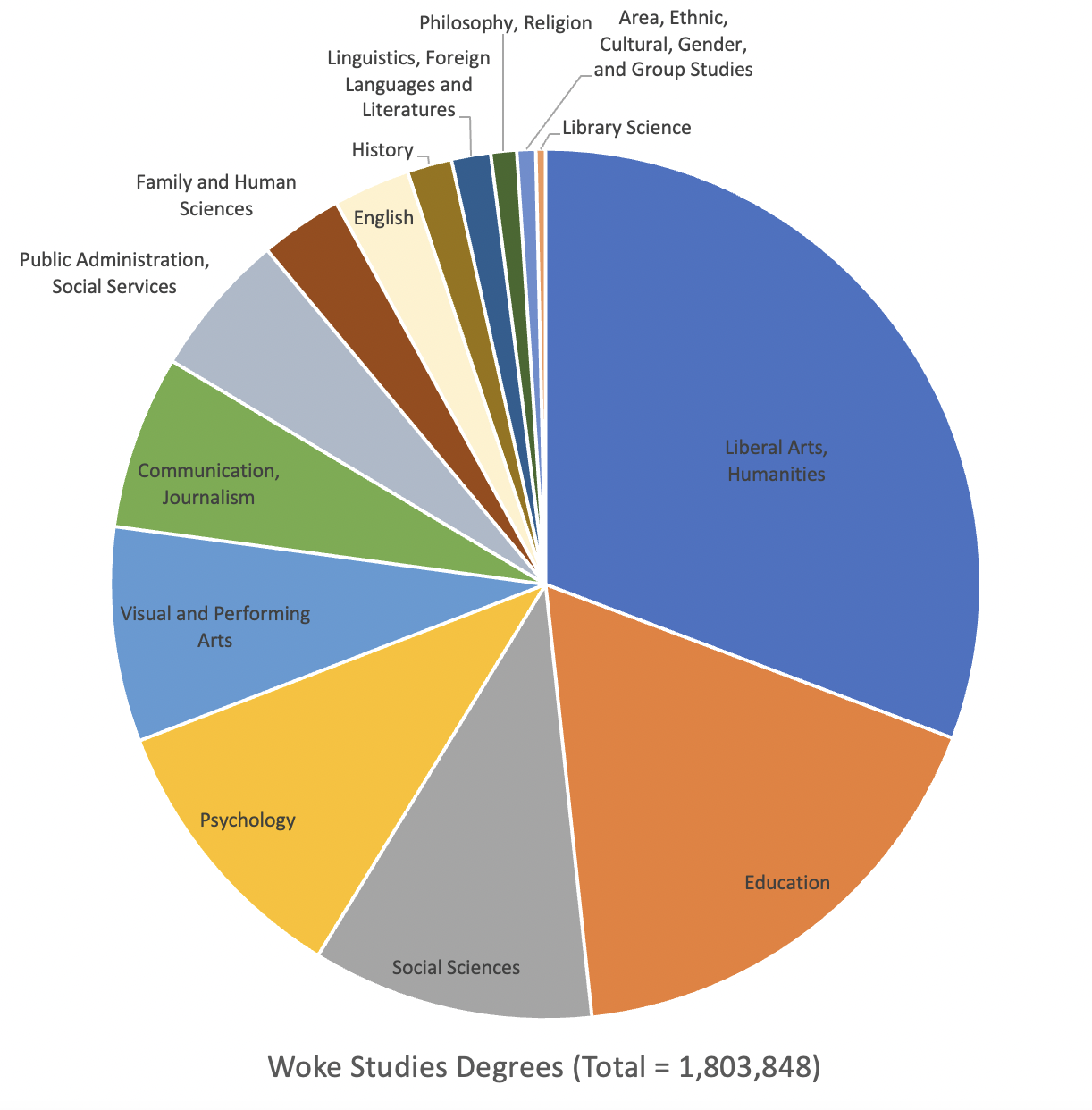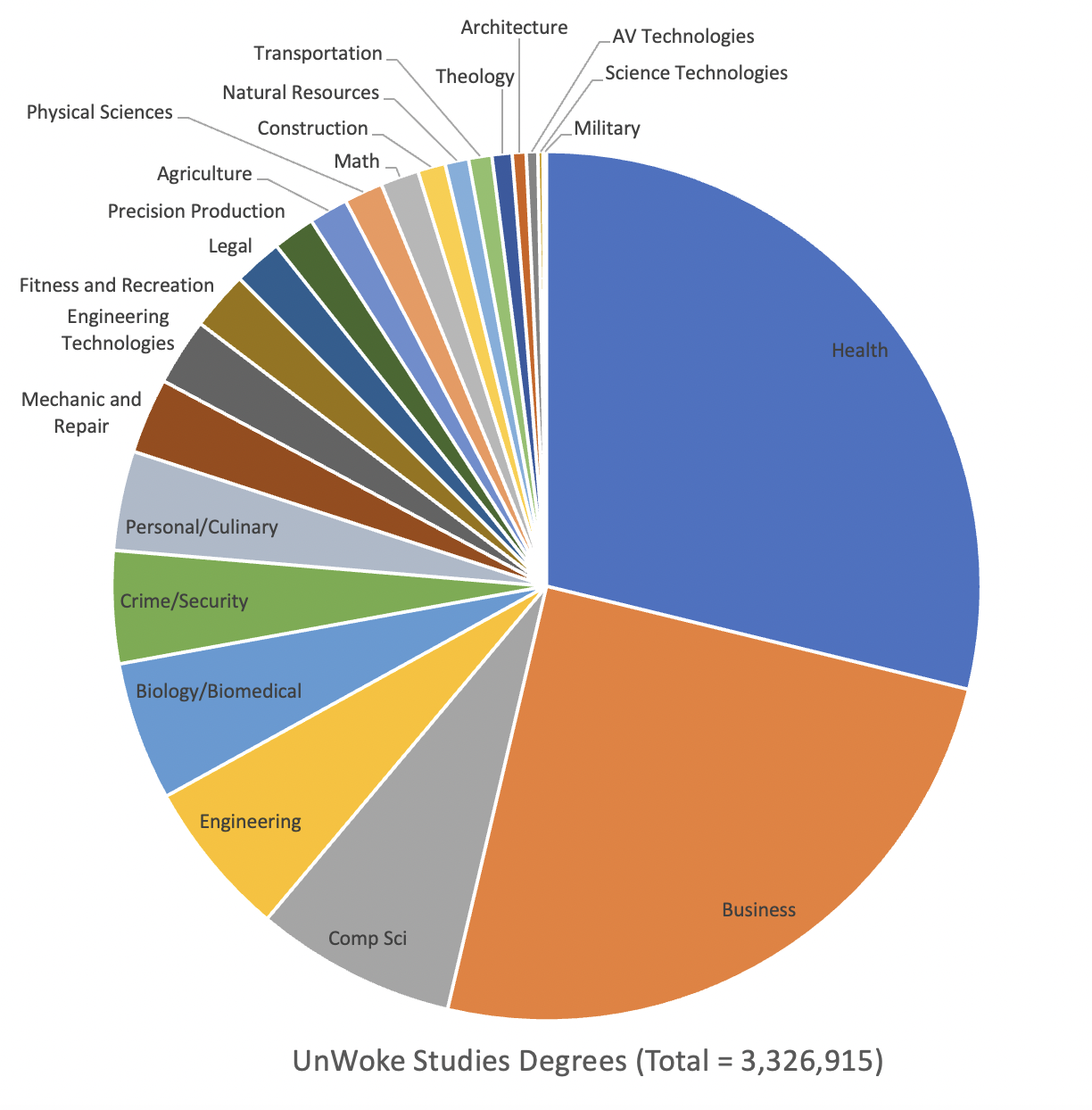
Some critics think that to merely step foot on an American college campus today is to be immediately assaulted by gender studies speakers and decolonization posters. Each and every student, it appears, is caught in a web of woke studies from which there is no escape.
But spend a cozy evening nestled by the fire with the latest data from the U.S. Department of Education’s National Center for Education Statistics portal and you will be reassured. I estimate that only 35% of the 5.1 million degrees conferred at the associate’s level and above for the 2020–21 academic year were in fields that are plagued by wokeness, or more generic far-left ideology. And while it is true that the vast majority of American professors lean left, those who teach the other 65% of students are far more limited in their ability to impose ideological litmus tests on graduation.
The two charts below show the 1.8 million degrees conferred in fields dominated by wokeness, and the 3.3 million degrees conferred in other fields. They are a bracing reminder of what actually goes on at an American college or university, most of which is practical and applied training for useful careers. For all the abuse heaped on grievance studies degrees (black, ethnic, native, gender, women’s, queer, etc.), they are gnats in the great pond of higher education. More students earned degrees in AV support services (14,300) than in grievance studies fields (12,656) in the 2020–21 academic year. And while the history wars rage on in the public square, there is no reason to suppose that academic historians are fully to blame. More people graduated in construction trades during this academic year (34,238) than in history (29,937). While some professors might dream of construction workers who recite Marxist history like Matt Damon in Good Will Hunting, a better bet is that those graduates are Trump supporters.


To be sure, there is a creeping ideological agenda in the unwoke fields. Medical schools, for instance, seem more focused on micro-aggressions than microscopes. Fitness and parks, architecture, criminology, and even math have been subject to the cultural gusts from the illiberal left. But this is, I believe, more of an effect than a cause of woke illiberalism in the public square. The degrees themselves can hardly be blamed, since they are still overwhelmingly, and by necessity, centered on knowledge and training for specific tasks.
While publications like The College Fix and Campus Reform are essential reading to keep up with the intellectual blitzkrieg of woke studies, they are, by definition, not covering the entirety of higher education. The biggest news about postsecondary instruction these days is the emergence of new and interdisciplinary programs in areas like cybersecurity policy and technology management. There is little time for woke indoctrination in such programs.
Thinking of the dynamism and rapid growth of unwoke fields reminds me of how China solved its bankrupt state enterprises problem. Rather than engage in heated critiques of the problems of socialism and state ownership, the pragmatic Chinese let them die by neglect. Better opportunities were available in the private sector, and only the most agile and high-quality state firms could survive.
This may be a good way to think about higher education reform. As subsidies for woke studies departments dwindle, and as their graduates realize the declining earning power of their intellectually bankrupt learning, those departments will die off like so many East Is Red Number 26 Cathode Ray Tube Factories. Only the most intellectually robust liberal studies departments will survive, and they will be far less dogmatic than today. Until then, Long Live Parks and Recreation Studies!
Image: Adobe Stock
Thank you for writing this article! I really enjoyed reading about the history and importance of parks and recreation studies. I think it’s important to remember the value of these programs, especially in today’s world. Parks and recreation can provide a safe and healthy space for people of all ages to enjoy, and they can also help to build community and promote social equity. I hope that more people will learn about the benefits of parks and recreation studies, and that these programs will continue to thrive.
Unless things have changed, I wouldn’t include public administration in the “woke” degrees. I graduated with an MPA from Arkansas-Little Rock in the 1990s, and the curriculum certainly wasn’t woke. In fact, it had quite a few readings from classic neoconservative academics like Aaron Wildavsky and James Q. Wilson looking at the unintended consequences of bad policy and policy implementation as a warning of why it is necessary to THINK about second and third order effects of administrative decisions. My own thesis looked at garbage-can decision-making and federalism in the context of the Safe Drinking Water Act, basically an examination of the limits of top-down control by federal agencies – the idea of which was inspired by the work of centrist Graham Allison and conservative Phillip Zellikow applying public choice theory to foreign policy decisions in the Cuban Missile Crisis, using different models of decision-making.
George, I wish you were right. Alas, I fear public administration has gone Woke.
Mr. Gilley’s analysis of degrees offered is odd. Some of the unwoke degrees he cites are not degree programs at all (unless one considers certificate programs at community colleges as degrees). There is no such thing as a bachelors degree in mechanic/repair, construction, A/V support or personal/culinary. These are all vocational programs. When people refer to woke degrees they mean 4-year and graduate degrees.
It is also somewhat naive to think woke degrees are going away. I can remember black english courses being taught at the Calfornia State University at Fullerton 50 years ago. Indeed, some of the faculty teaching that tried to get the university to accept a black english course as satisfying the english class requirement in all degrees. Besides, the cohort of current students are woefully unprepared for serious scholarly work (e.g., in a STEM major) and I have seen that trending downward for the last 15 years. Too many kids are brainwashed into thinking a college degree is necessary or you can’t make a living. They have to major in something. Grievance studies as a major is ideal because they have no rigid intellectual requirements; anyone can complete a grievance study degree program.
Subsidies for woke programs will continue so long as there is a demand for them. As long as merit is downplayed in admissions, there will always be a demand.
Actually, there ARE such degrees. Purdue University, hardly a backwater community college, for example, offers B.S. or B.A. degrees in Construction Engineering, Construction Management, Retail Management, Hospitality and Tourism Management (including culinary management), etc.
Umass has a bs in turf management. Dont laugh — they manage golf greens for good money. Likewise urban forestry — managing city shade trees. But these programs are woke.
The count includes all 4 year degrees at the associates and above levels (bachelors, masters, doctoral). So these are indeed college degrees, not just programs and tracks.